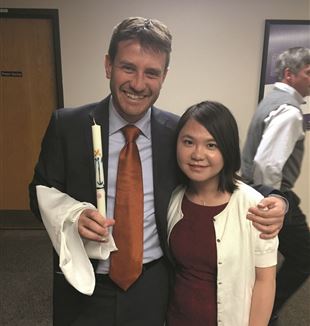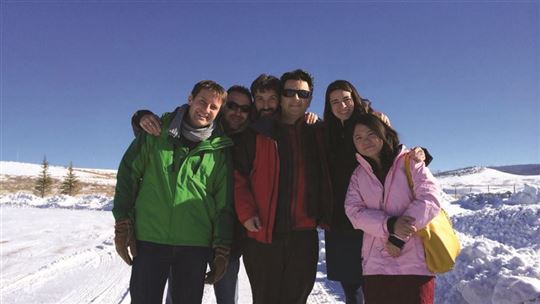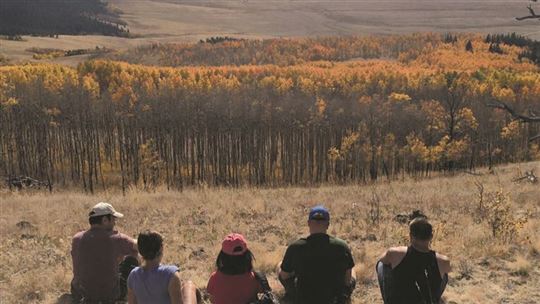
Doreen's Candle
Studies at Bocconi, the first flight to the USA, and the discovery that "faith is enough to live as men." The story of Lorenzo Patelli, professor at the University of Denver, where life "begins again only through facts."The late-winter sky over Denver promises snow again. This is the Mile-High City after all, where the 1,609-meter altitude gets the frozen wind that blows from the Rocky Mountains. Lorenzo Patelli has lived here since 2011, after a "ping-pong," for years, between Old Europe and the New World. Today he teaches at the Business School of the University of Denver.
Born in 1977, in Varese, Lorenzo graduated from Bocconi University in Milan. The first time he came to the USA was in June 2004, on a direct flight to Los Angeles. In his suitcase, he had the drafts of his doctoral thesis and a six-month visa. "I had sent emails to the various departments of Economics at the best American colleges, requesting to continue my studies on multinational companies," he says. "A professor from the University of Southern California responded and asked me, 'What do you need?' I said, 'A desk and a telephone.' 'Ok, then we'll be expecting you.'"
The environment quickly conquered him. "I had the feeling that I was arriving on another planet," he remembers. "The rules of the game were completely different, but above all there was an extraordinary energy and seriousness in the air. Individual goals had value - in fact, they were the true motor of every project. And then it struck me to find among people the sense that life is beautiful and a great desire for friendship."
Lorenzo is a Memor Domini, and when he was in Los Angeles he lived in a house with three other Italians and a Chilean who were on the same path with him. "They worked like crazy, and yet they weren't detached from their context. In them there was a freshness that remained intact even after ten years of life in America. There, I saw that faith is enough to live as men. And this only made my desire to move here permanently grow."
It was a desire he would later fulfil. After a brief stint at the University of Rotterdam, in Holland, and another, longer one at Benedictine College in Kansas, in 2011 he received an offer from the University of Denver. The decision to move again, after so many years of wandering, was not easy. There is not even a house of Memores Domini in Colorado. All hesitation was cleared away by a question that Father Carrón asked him during a conversation. "Either you can resist a place and not love it, or you can go wherever and truly fall in love with the place where you belong," Carrón had said. "What do you prefer?"
It was a watershed moment. Lorenzo, who had reduced everything to a practical "go or don't go," now understood that there was a different measure. "I decided to pull up anchor in Kansas, where there was everything - job, community, and house - and go back out on the sea."
Lorenzo's travel companion was Father Giussani. "His biography had just come out: page after page, I saw how everything in him, his every movement, was born from the simple facts that he lived: the confessional, an encounter on the train, the objection of a student …. Above all, I saw that he never separated himself from these facts. He looked at them and he told them to others, until he understood them in all their depth. And I had nothing more sophisticated. I woke up in the morning and had that day."
This realization was a second watershed moment from which, little by little, new encounters began to happen.
The first was with Doreen. She was 27 years old, from China and in America pursuing a master's degree. One morning she came to Lorenzo's office. She is four feet, nine inches tall, but full of character. "She wanted to know if I had a project she could get involved in. So I put her in contact with Mike, one of my students, the only one in CL, to divide up the work." The two had just barely met when Doreen, having found out on Facebook that Mike was Catholic, asked him about it. He mentioned it to Lorenzo while they were on the chair-lift, on one of the many Saturdays they spent skiing. "Like a good American, he was hesitant to make any kind of explanation to her. I told him, 'Invite her!'"
The first occasion was the Lent retreat. Doreen went, even though she had little background or cultural reference. She was light-years away from what they are talking about. She had only heard Jesus spoken of once, when she was the guest of a Protestant family. At the end of the retreat, Mike came up to her, and she said, "I understood the theme: it was 'to live.'" A few days later, Doreen came to Lorenzo's classroom. "Prof, why are you friends with Mike and those two girls who study Political Science?" "We share something that happened to us," he replied, "the greatest encounter of our life." And while he spoke, he turned to the board and drew the image that Father Giussani used to describe the Incarnation: a few lines that go down toward an "x" and one line that comes down from the "x." While Doreen studied the drawing, Lorenzo invited her for a study vacation.
During that weekend, the students watched a video with a testimony from Elvira Parravicini, neonatologist in New York, who directs a "comfort care" ward for terminal newborns. Doreen could not go to sleep that night. "I never thought about life in these terms, about the infinite value that each of us has," remembers Doreen. "That evening, I realized how faith introduces a new way of seeing things," Lorenzo adds. "This comes before being in agreement about the big questions. She didn't come to understand the reasons why abortion is wrong, but began to be surprised by the fact that reality is bigger than what we would instinctively make of it."
The friendship between the two grew, spurred on by Doreen's growing curiosity about faith. On one occasion, some Memores from Los Angeles came to see Lorenzo. "I had not explained my vocation to Doreen," he explains. "It still seemed too complicated for her." They invited her to a trip in the mountains. The day after, Lorenzo tried to clarify the situation, but Doreen interrupted. "Yesterday, I watched you guys the whole day," she said. "I understood why you live like this: it's because your happy."
From that moment, Doreen desired to become Christian. She received Baptism during the Easter Vigil in 2016. Lorenzo was the godfather. She, like all the other catechumens, held a candle in her hands, and wanted to decorate it with the lines and the "x" that Lorenzo had first drawn on the board for her.
In the five years Lorenzo has been in Denver, there was another fundamental encounter. In the fall of 2013, he received a phone call from the CL secretary in New York. They told him about a man in a prison a few hours from Denver, who had asked to start receiving Traces magazine. His name was Jim; he was 45 years old and had been in jail for 20 years. Lorenzo organized a group of a few friends to go meet him. "It took us months to manage it. There was so much bureaucracy, because it was a medium security prison," Lorenzo recalls.
After a lot of paperwork and a three hour drive, the time for that first encounter had arrived. "Passing through the entrance, we soon found out that nothing would be how we imagined it. We couldn't bring anything in with us: no books, no magazines, no photos. And then our clothing was all wrong: no sandals, no tank tops, no green or orange colors, because those were the colors of the different divisions of prisoners." The four of them went back out to find a place to buy some new clothes. After that, there was only a little time to spend with Jim. But he bowled them over with his story: the crime, the conviction, the return to the faith, the Masters in Theology through a correspondence course and the groups he started to help the other prisoners. "We thought we were going to meet someone who needed our help and instead we saw a man who was alive, standing strong because of his faith," Lorenzo says.
They started writing to each other, and other friends from the Denver community got together to go see Jim. In the prison, all this movement started to arouse curiosity. After their regular Saturday afternoon visit, a guard accompanying the visitors blurted out, "How the hell is it possible for young people to be this good?"
But the biggest surprise was for Jim himself. He changed again after meeting these friends from Denver. One evening, he had to return to his cell, and according to the ritual of the jail, he had to repeat a certain phrase: his name and the request to come back "home," a nickname for his cell. In the whole penitentiary, there had never been a prisoner who agreed to call it that. "But Jim, that night, left everyone speechless," Lorenzo recalls. "He said to the guards: 'My name is Jim and I am going home.'" Jim explained his motivation in a letter. "Freedom," he wrote "is to feel yourself at home in every circumstance."
Six months ago, Jim got out of prison, and was granted house arrest. Now he lives at his mother's house, just a few minutes' drive away from Lorenzo. "We go to see him often. When he wrote to us that he was leaving, I was full of anxiety. I thought that we would have to start helping him with work, with money, with everything. But, from our first encounter, it was clear that the point is not to resolve each other's problems, but to continue to be for each other the possibility for the Mystery to draw us closer to Himself. And this is what Jim had said in the letter he wrote just before leaving prison: 'What I need most, you have already given me. It is the awareness that someone is waiting for me out there; I know that I am loved.'"
The possibility of being loved is something that has deep roots in Lorenzo's life. It goes back to his time in college. At that time, he was dating a girl from Varese. He left Milan on Friday afternoon and returned, saddened, on Monday morning. "For those five days at the university, I felt this distance." Then one evening in his third year, when he was coming back to his apartment, something happened that left a mark. "My roommates were all asleep. The house was totally dark. Only one of my friends was awake, in the corner of the room studying. He greeted me with a smile and said, pointing at my friends' room: "Why do you care for them so little, if Christ cares for them so much?" That wounded Lorenzo, and began to plant in him an interesting provocation, even if it seemed too ideal. "Over the years I realized that that phrase stood over me, questioned me. It called to me through the things I did."
Today, even if Christmas is already over, the words of Saint Bernard on the CL Christmas Poster remain insightful. "He wanted to come among us, when He could have simply settled for giving us help," it reads. A few weeks ago, an email from a first-year student, Steve, asked him to allow him an extension on an assignment: he had to go to home to Arizona, to his father who was terminally ill. "I answered, 'Steve, don't worry; do what life asks of you. I will pray for your father and we'll be in touch.' He responded right away, 'Your words mean more than you know.' And he was right! Because I truly do not know how I can be useful to the people I encounter. I cannot have a strategy." And Steve recognized this, because right after his father's funeral, the first door he knocked on was Lorenzo's. "I only told him one thing," says Lorenzo, "to keep coming to class. Even if he was down, even if he wasn't prepared. Because both he and I need to be in touch with reality in order to live. We need the other. It is there that everything happens."
This is precisely what the "x" on Doreen's candle means. Today she often asks her friends, "If I go back to China, will the memory of what I've lived here be enough?" The first time she asked, Lorenzo stalled. The second time, he told her, "No, it won't be enough. God doesn't change the method. He will come looking for you again within a particular story."